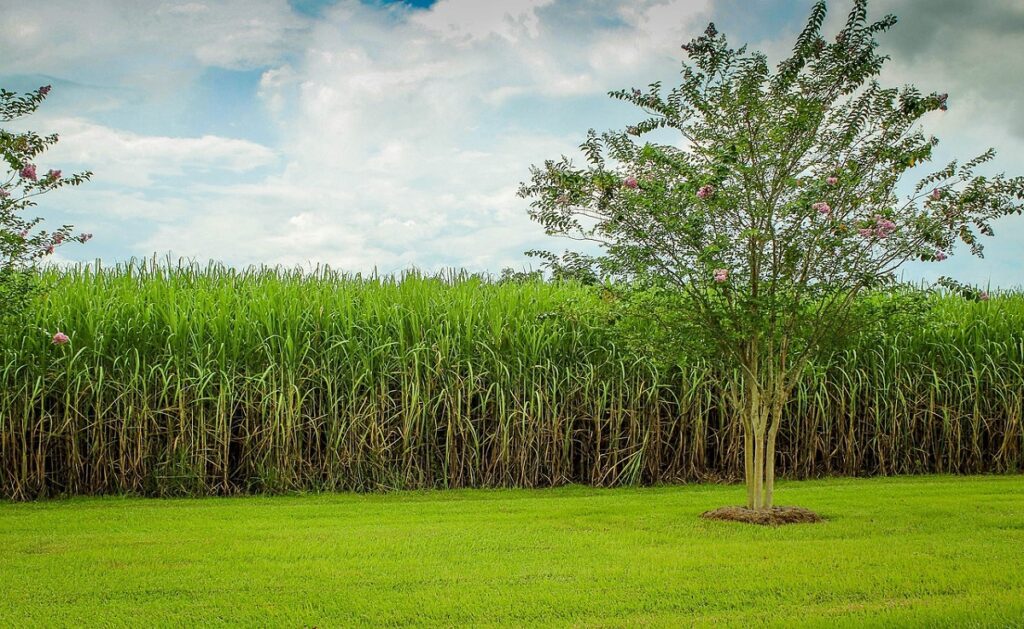Proven as an excellent raw material for production of biofuels and other renewable materials, sugarcane is sweetening the potential of biotech solutions to reduce our environmental footprint.
Numerous sugarcane types are being tested by scientists to find new, environmentally friendly applications, and gene editing can help to improve sugarcane’s usefulness as a raw material. The resulting biologically based solutions may have a huge impact on the world’s health.
There are several biomanufacturing applications for sugarcane that offer environmental benefits. For example, it is being used in combination with corn and sugar beets by Virent to create a bioplastic that is produced with lower emissions and carbon intensity than traditional, petroleum-based plastic. Virent was an essential part of Coca-Cola‘s recently announced run of 900 plastic bottles made entirely of plant-based ingredients.
Another creative use for sugarcane comes from Amyris, a biotech company that specializes in synthetic biology (synbio). Amyris makes genetically modified yeast and ferments it with sugarcane to generate sustainable squalane, a replica of the squalene that is produced naturally by humans (and sharks) and is a skin moisturizer. This means there is no need to obtain squalene from sharks’ livers, including livers of endangered species, Bio.News has reported.
Biofuels help us go green
Perhaps the biggest impact sugarcane can have on the environment in the short term is by reducing emissions from transportation. According to the U.S. Environmental Protection Agency, the largest contributor to anthropogenic U.S. greenhouse gas (GHG) emissions is the transportation sector.
Biofuels are a more environmentally friendly alternative to fossil fuels, because of their reduced carbon emissions. Plant-based biodegradable fuels made from sugarcane, corn, or other renewable feedstocks are used to make ethanol, a chemical compound that is used as a renewable fuel.
Ethanol helps the process of reducing air pollution and dangerous exhaust emissions by adding oxygen to gasoline, and it can improve the overall performance of vehicles using it, according to the U.S. Department of Energy. It has also been found to perform much better than any other liquid biofuel produced currently on a commercial scale, according to a report.
Sugarcane is proving to be a highly efficient ethanol feedstock, and is considered one of the best feedstocks grown in tropical and subtropical regions. In Brazil, ethanol is almost exclusively made from sugarcane, with reported production of 32.5 billion liters of sugarcane ethanol in the period between 2019 and 2020.
Gene-editing enhances possibilities
Sugarcane displays all the traits one ideal biofuel crop should have, such as fast growth, high yield, reduced inputs, low processing cost, and high positive energy balance. Still, the possibility of improving one of these traits can result in an increase in product yield.
A paper published by the National Center for Biotechnology Information reviews the overall use of sugarcane as a feedstock for the production of biofuel and addresses some gene editing approaches aimed at quality improvement, with a particular focus on CRISPR. CRISPR gene editing offers a faster means for achieving the same results as cross-breeding, and the USDA regulates gene editing with CRISPR-Cas9 the same way it regulates conventional cross-breeding.
In a study at the State University of Campinas (UNICAMP) in Brazil, scientists found that orphan genes were present in wild sugarcane. Orphan genes are genes that have no detectable similarity to genes in other species or lineages, and they “may support rapid adaptation to environmental changes,” according to their research, and it has been suggested that they can help make growth of sugarcane more productive and sustainable.
Biotechnology advances such as gene editing have already “produced a significant effect on the improvement of cane quality, reduced cane losses to diseases and pests and alleviated the chemical input of weed control methods which has the advantage of reducing environmental degradation,” according to research.
Continuing improvements in the way we grow and use sugarcane are making the environmental benefits of this versatile crop that much sweeter.




